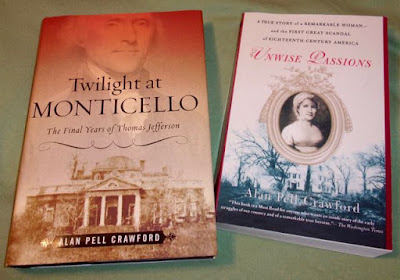Two Jefferson-Randolph Books
While researching my genealogy, I learned several of my ancestors were in Virginia in the 17th and 18th centuries. Curious about what their lives might have been like, I started reading non-fiction about life at that time. (I blogged about some of what I'd learned in "Colonial Ancestors.")
Recently, I read two non-fiction books by Virginia author Alan Pell Crawford: Unwise Passions and Twilight at Monticello about two individuals from early Virginia families: the Jeffersons and the Randolphs. Likely some of my 18th century ancestors would have known them—or at least known about them.
Both books are well-written and researched. Not only did I learn about the subjects of the books—Thomas Jefferson (1743-1826) and Anne Cary—"Nancy"—Randolph (1774-1837), who were distant cousins, but I also learned about life and events during the times before and after the Revolutionary War. The Jefferson and Randolph families married back and forth for generations, so family members were kin to each other in several ways. For instance, Thomas Jefferson's mother was Jane Randolph, and his daughter, Martha "Patsy" Jefferson, married Nancy's brother, Thomas Mann Randolph, Jr. (1768-1828).
The family relationhips are complicated. Fortunately, in Unwise Passions, Crawford provides the Randolph family tree that shows connections between the two families:
I bought Unwise Passions because I'd read something on the Interet about an 18th century scandal involving the prominent Randolphs, and it piqued my curiosity. This back-cover blurb summarizes the book:
In the spring of 1795, the eighteen-year-old Nancy Randolph, the fetching daughter of one of the greatest of the great Virginia tobacco planters, was accused, along with her brother-in-law, of killing her newborn son. Once one of the most sought-after young women in Virginia society, she was denounced as a ruined Jezebel, and the great orator Patrick Henry and future Supreme Court justice John Marshallwere retained to defend her in a sensational trial.This gripping account of murder, infanticide, prostitution charges, moral decline, and heroism that played out in the intimate lives of the nation's Founding Fathers is as riveting and revealing as any scandal—in or out of Washington.
The book was so compelling that I read all 278 pages of the text within three days. When I saw that Crawford had also written a book about Thomas Jefferson's later years, I also wanted to read that one.
Both books mention that Thomas Jefferson spent his childhood at the Randolph plantation, Tuckahoe, which his father Peter Jefferson (who was married to Jane Randolph) managed after the death of his friend William Randolph I. Thus, Peter's children had a close relationship with William's orphaned children. Nancy is the daughter of one of those children, Thomas Mann Randolph I.
 |
| Tuckahoe Plantation |
Unwise Passions chronicles Nancy's life from childhood through her death in 1837. Much information is also provided about others in her family and about those who played significant parts in her life, such as Patrick Henry and how he rose from humble tavern-keeper origins to became a lawyer.
Twilight at Monticello recounts how Jefferson spent the years after retirement from his political life. A back-cover blurb by Peter Onus, Thomas Jefferson Professor of History at the University of Virginia, provides a concise summary:
". . . Juxaposing affecting scenes of Jefferson's domestic life with fresh and illuminating perspectives on his subject's late-life political, philosophical, and spiritual occupations, Crawford's fine book should engage and reward a wide readership. This is a wonderful introduction to one of the most fascinating—and one of the most generally misunderstood—figures in American history."
Jefferson's life is also marked by scandal—the Sally Hemmings affair—but he never acknowledges it either publically or privately. When his grandchildren once show him a poem that had been published about his relationship with his slave, he merely laughs. FYI: Crawford provides a diagram of Monticello that shows Jefferson's easy access to Sally's room. Twilight at Monticello gives a good balance between Jefferson's strengths and his shortcomings.
I especially liked the way both book were written— no footnotes to interrupt the flow of the narrative but numerous documentation in the end notes. Here's an example:
Many years ago, when my classmates and I studied Virginia history in the 7th grade, we were led to believe that all plantation owners were very rich and lived in elegant mansions, but both books make it clear that plantation owners were land rich but cash poor. Borrowing heavily against their next year's crop to maintain their lavish lifestyles, the plantation owners were always in debt, usually to British banks. After their deaths, the debts passed on to their heirs. Jefferson's mounting debts was why Monticello fell into disrepair in his later years, and why it was sold outside the family after Jefferson's death on July 4, 1826.
Both of these books are excellent. I highly recommend them.
~
Labels: 18th century, Anne Carey Randolph, Thomas Jefferson, Twilight at Monticello, Unwise Passions, Virginia history



